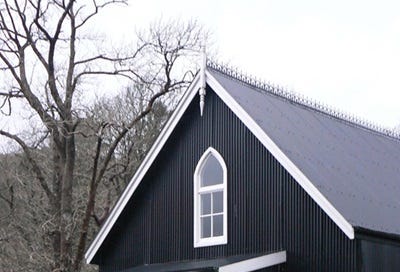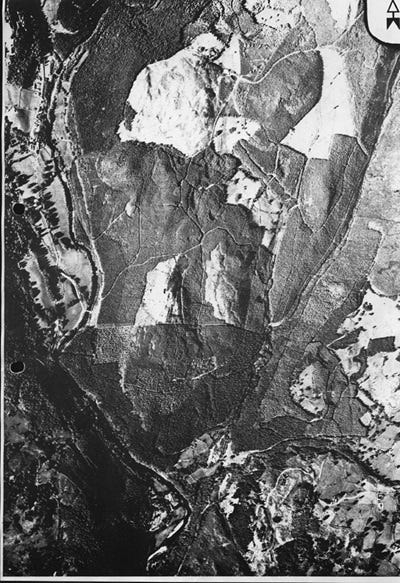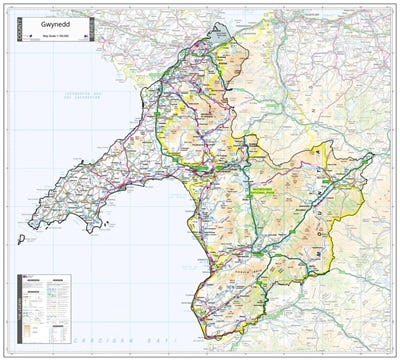A number of recent local happenings have made me think a bit and re-assess some decisions I came to earlier and on the way I was reminded of changing relationships due to my increasing age.
above: Coleg Meirion Dwyfor, Dolgellau, the best bilingual tertiary college in Cymru, probably…
I'll explain. Way back in the mid nineties, aged 40, I went for an interview for a job with my local further education college, Coleg Meirion-Dwyfor, as a technical tutor on a performing arts course. I got the job, both because of a previous incarnation as stage carpenter, technician and occasional designer in professional theatre and also because I'd been learning Cymraeg (Welsh) for the same length of time and was considered reasonably fluent. I'd also had nearly a decade of teaching in the informal sector (teaching permaculture design) but in comparison, this felt like jumping into the deep end.
I remember going to my first staff meeting at the College, all in Cymraeg of course (Coleg Meirion-Dwyfor was and still is a bilingual tertiary college with Cymraeg the first language) and not understanding a single item on the agenda due to the unfamiliar educational terminology and acronyms; what on earth were SPOC 1 and SPOC 2 reports, for instance?
Too embarrassed and shy to ask I just sat quietly through it and got the explanations later from my boss, Mair (the performing arts course coordinator at the time and probably the best boss I've ever had, certainly the most fun!). Incidentally, SPOC 1 and SPOC 2 are both questionnaires entitled Students Perception Of College- I must admit I was disappointed to find they had nothing to do with Star Trek.
Nearly a decade later and in a programme area meeting (in my case, of the arts courses) I realised, firstly, that whenever a sticky issue came up, everyone turned to look at me and secondly, that I was now the oldest person in the room. Admittedly the arts courses seemed to take on younger teaching staff and there were certainly lecturers in the Coleg on other courses who were older than me but it did make me think.
A similar thing has happened with my local community or parish council, that of Cyngor Cymuned Y Ganllwyd, (Ganllwyd Community Council). Community and Town Councils are the lowest tier of government in the UK with County Councils and the National Governments stacked above them. Ganllwyd parish is one of the largest in Cymru, in terms of physical area, with nearly half taken up by Coed Y Brenin and containing a huge network of footpaths. In terms of population it is one of the smallest with just 98 properties registered for Council Tax.
above: Neuadd Y Pentref Ganllwyd or Ganllwyd Village Hall. Among other things, seat of very local government, namely, Ganllwyd Community Council. A repurposed corrugated metal chapel. Note the notice board, part of the extensive property of the community council (one of two).
Back in 2008 I was asked by one of our local Community Councillors if I would like to join. This felt like a remarkable privilege for an incomer, even though we'd been living locally for 25 years. It turned out that the same locals had been on and off the council for years and most had had enough of it, so they needed to co-opt someone to make up the numbers.
The reason I was asked was because I spoke Cymraeg; if an English monoglot had joined, the community council's income was too small to afford to pay for simultaneous translation, the meetings would then have had to switch to English. That would have been another blow to the language and culture and there were enough of those as it was.
Sixteen years on, now closing in on 70, I've seen four clerks come and go, am on my second turn as chairman and find myself to be the oldest and the longest standing member, or perhaps that should be sitting, I dunno. Which feels a bit odd sometime.
Also, I have never been elected. After initially being co-opted to the council, there has not been an election since, due to the simple fact that not enough people register as candidates to even reach our maximum number of councillors, meaning elections are not needed and we usually have to persuade someone else to join after the date for the non-existent election has passed. It seems a stretch to call the council democratic.
above: aerial view of part of the parish; Ganllwyd to the left, Mynydd Penrhos and the beginnings of Coed Y Brenin centre. The parish extends much further to the north, as does Coed Y Brenin, now.
Nor is our council alone in this respect, though it seems a characteristic of the smaller ones without much income- our annual precept (a share of what the parish pays in council tax to Gwyneth County Council) is just £3000, most of which goes on the clerk's wages (the only paid role), insurance of the council's property (two bus shelters, two notice boards and a bench), internal and external auditing of the council's affairs including our accounts (exactly the same onerous process and depth of investigation being applied to our tiny council as to say Caernarfon with an income in the hundreds of thousands of pounds) and rent of the village hall for our monthly meetings. Rather surprisingly perhaps, we still generate a surplus and feed it back into the community in various ways, like installing two defibrillators in the parish and donating to very local charities.
The small group that make up our council, (six other councillors as well as me, our County Council representative and our clerk) are of very varied backgrounds, from farmer to NHS worker to ex-policeman to permaculture designer (myself...), health inspector and so on. Whatever their political stance (or not) they tend to operate as freethinking anarchists in our meetings. From an agenda item relating to a blocked culvert the discussion can easily spin off into visitors leaving litter, lack of maintenance of footpaths, the unfairness of council house exchanges and the current state of provision for young people or even local honey production. My role as chairman is roughly equivalent to herding cats as I try to steer us back to the matter in hand.
above: the top tier of government in Cymru, way down south from Ganllwyd, in Cardiff.
I had been thinking of stepping down next year but community and town councils have a lot of potential. As the lowest rung of the government hierarchy, in theory they are closest to and in contact with grass roots at a very local level. We are the folk who see the effects of cuts on the street and for us, in the forest, fields and hedgerows.
Back in my early days on the council and for several years, the Gwynedd Council representative who attended our meetings happened to be their financial officer, one of the key people who had to decide where to make the austerity cuts that rolled out from 2011 onwards under successive Conservative governments. An older man and staunch Plaid Cymru member and hence old school socialist, he had to preside over the dismantling of many of the social gains he and his comrades had painstakingly built up over many, many decades.
We were treated to a close quarters view of the erosion of funding as Gwynedd Council were forced to axe grants to the youth clubs, support for groups working against domestic violence, drug and alcohol addiction and a whole range of other services. All of which in turn led to increases in stress and anxiety within communities and placed yet more pressure on the NHS and police.
Before the austerity cuts really kicked in, it felt like we had some power or influence. A local might pass on information to a member that say, the edge of one of our single track roads was breaking up. We would inform Gwynedd Council and usually in just a few days, workers would appear and repair the surface before it got any worse. Now the response may not occur for months so the road continues to erode, meaning the repair becomes more expensive. Worse, the actual repair may well not be as good as previously, tarmac being replaced by concrete which cracks over time. In some cases the repair actually worsens the situation by say altering the flow of water so it drains across the road, rather than down a drain. This suggests an erosion of experience within the workforce, another consequence of the cuts.
above: the middle tier of government in Cymru, Gwynedd Local Authority, with the seat of the authority way up north from Ganllwyd (well, a bit up north). A huge area with most of the population living along the north coast.
However, despite my growing disillusion about the actual power or influence of small councils, a number of events occurred which have made me think again. Here's one of them. A relatively quiet member of our council, asked what appeared to be a simple question, about how the six council houses in Ganllwyd were allocated. This followed from her observation that three of the three bedroom houses had been let to single men. Given that our village has already lost its excellent school, She suggested that there was a need to have young families with children in the council houses, to keep the community alive.
After much discussion in support, we wrote a letter to Gwynedd Council asking for clarification regarding the allocating of council houses and asked out Gwynedd Council representative to raise the matter in their next meeting. From there the matter spread out through Gwynedd's Councillors to the town and community councils pretty much throughout Cymru and was taken up by our senate member (Aelod Seneddol or AS) and raised in our Welsh Government.
This struck me as a good example of minimum effort, maximum effect, (or perhaps a butterfly flapping its wings and causing a hurricane!), that one concerned person can focus the attention and energy of a very large number of others, by being in the right place at the right time and asking the right question. Since then this has occurred on other occasions, with the same councillor often being the one to start the ball rolling! Incidentally, she used to apologise for asking questions; now I tell her there is absolutely no need to apologise and point out to her what power her questions have had!
So small groups can wield power and influence and one thing to be said about the embryonic democracies of Classical Greece is that they were small. Some had less than a hundred voting citizens and Athens, arguably the largest, even at the peak of its power is thought to only have had between 20-25,000 citizens with the vote1. The great advantage of them being small was that you could get all the citizenry together in one place and discuss things and come to decisions, in theory at least. Its worth mentioning that the Greek weather aided this process greatly2.
So with a population of just a few hundred, around the Dunbar number or ideal size for a community, our parish has the potential to be an extremely democratic place to live, in theory. In theory we could all squeeze into our village hall and hold meetings that led to genuinely democratic decisions.
In the future, as we continue to move into times of slow growth, static and shrinking economies and face ever increasing costs and hence further cuts, this very local level of government may come to be the most significant. For instance, if a road requires repair or a culvert becomes blocked, why do we currently ask Gwynedd Council to sort it out and then wait until they get it together? because this is the way it has been done for a generation or so, yet our local community contains folk with the experience, skills and tools to do it for ourselves.
What's required is a change of attitude from dependency to self reliance and a few additional techniques regarding organisation and empowerment, including methods for countering populists.
So it looks like I'll be staying on at Ganllwyd Community Council after all.
Many thanks for reading. Feedback always welcome. take care all. Hwyl! Chris
Admittedly the same number of people didn't get the vote because they were women and two to three times that number didn't because they were slaves. Hence we should use the word democracy (government by the "demos", the people) very carefully in relation to ancient Greece.
Its also worth mentioning that the people who were good at public speaking tended to be the ones who were heard. Teachers of rhetoric (basically public speaking) advertised their skills by saying how they could win any argument, whether it was right or wrong. During the disastrous Peloponnesian War between Athens and Sparta and their allies, the Athenian Demos in their assembly were repeatedly won over by the stirring speeches of members of the war party who advised continuing the war despite terrible losses of life. Today, populists who employ simple rhetoric have managed to produce similar swings within populations.









Thanks Chris another interesting article. Yes over the last year I've been in the observation stage of joining the local PCC - starting with myself and feeling an interest and even intention. Lots of stories good and bad from locals (and other non-local friends that have become PC counsellers elsewhere), a fair bit of factionalism within the existing body, and feeling it might be fun to rock the boat (not sure that's the right approach tho) but definitely to start as local as poss. Good to hear your experience!
Thanks Chris , it was a very enjoyable read.. i think there are many similiarities in our village inFrance, especially the larger councils having all the funding and control over repairs etc, but being further and further away.. Our Mayor once said "the village is us " we have to take charge of things like maintenance. the big problem is with 2nd home owneres who come , and go, are not there to help out in crises, but never fail to complain about pointless details that they may see as important, often missing bigger issues, due to the lack of connection /integration in the landscape.. best wishes to you all Andy